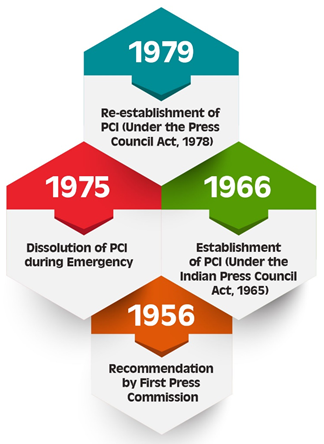Syllabus: GS2/Fundamental Rights; Government Policies & Interventions
Context
- At the 19th edition of the Ramnath Goenka Awards for Excellence in Journalism awards ceremony, President Droupadi Murmu emphasized the critical role of journalism in sustaining democracy.
Journalism in Democracy
- Journalism is often referred to as the ‘Fourth Estate’, as it acts as a watchdog, ensuring transparency, holding power accountable, and providing citizens with the information necessary to make informed decisions.
- In a democracy, the free flow of reliable information strengthens public discourse, enabling active citizen participation.
Historical Significance of Journalism
- Colonial Era & Early Restrictions: The British government enacted laws such as the Vernacular Press Act (1878) to curb nationalist sentiments.
- Newspapers such as Kesari (edited by Bal Gangadhar Tilak), Bande Mataram and Amrita Bazar Patrika played a crucial role in mobilizing public opinion, often facing suppression.
- In India, the press has been instrumental in:
- Exposing corruption: Investigative journalism has uncovered scandals like the Bofors scam, the 2G spectrum case, and the Vyapam scam.
- Framing Legislations: Newspapers and TV debates have influenced key policies and legal reforms, such as the Right to Information (RTI) Act.
- Ensuring electoral integrity: Media coverage of elections educates voters about candidates, policies, and political manifestos.
Functions of Journalism in a Democracy
- Providing Accurate and Timely Information: A well-functioning democracy depends on an informed electorate.
- Journalists gather, verify, and disseminate news about governance, policies, and social issues, enabling citizens to make knowledgeable choices.
- Acting as a Watchdog: The media plays a crucial role in holding governments, corporations, and institutions accountable.
- Investigative journalism helps expose corruption, human rights violations, and abuses of power.
- Facilitating Public Debate and Opinion Formation: Through editorials, debates, and opinion pieces, journalism provides a platform for diverse viewpoints, fostering a culture of discussion and dissent—both essential for a healthy democracy.
- Educating Citizens: Beyond news, journalism provides critical analysis of economic policies, health issues, and global affairs, enabling people to understand complex topics affecting their lives.
- Defending Press Freedom and Human Rights: A free press is the foundation of any democracy. Independent journalism ensures that governments do not suppress dissenting voices, thus preserving democratic ideals.
Challenges in the Modern Journalism Landscape
- Fake News and Misinformation: With the rise of social media, unverified and misleading information spreads rapidly, often influencing public opinion and electoral outcomes.
- Political and Corporate Influence: Media houses often face pressure from political parties and corporate entities, leading to biased reporting. This undermines journalistic integrity and affects public trust.
- Attacks on Press Freedom: Journalists worldwide face censorship, legal threats, and physical violence. In India, reports of intimidation and arrests under sedition laws have raised concerns about declining press freedom.
- Financial Sustainability: The transition to digital media has disrupted traditional revenue models, making it difficult for independent news organizations to survive without corporate or political backing.
Key Legislations Strengthening Journalism in India
- Press Council Act, 1978: It established the Press Council of India to maintain journalistic ethics.
- Acts as a watchdog against media misconduct but has no punitive powers.

- Right to Information (RTI) Act, 2005: Enables journalists to access government records and promote transparency.
- Used extensively for investigative journalism.
- Whistle Blowers Protection Act, 2014: Provides protection to individuals (including journalists) who expose corruption.
- Cable Television Networks (Regulation) Act, 1995: Regulates content broadcast on TV channels to ensure responsible reporting.
- Information Technology (Intermediary Guidelines and Digital Media Ethics Code) Rules, 2021: Introduces content regulation for digital news media.
- Mandates grievance redressal mechanisms.
- Defamation Laws (Indian Penal Code Sections 499 & 500): Often misused to suppress press freedom but also ensures accountability.
Supreme Court Observations on Journalism in India
- Romesh Thappar vs State of Madras (1950): Affirmed that freedom of the press is part of free speech under Article 19(1)(a).
- However, this right is subject to reasonable restrictions under Article 19(2), allowing the government to impose limitations in cases of national security, defamation, or public order concerns.
- Bennett Coleman & Co. vs Union of India (1973): Struck down government control over newsprint, reinforcing media independence.
- Indian Express Newspapers vs Union of India (1985): Ruled that imposing excessive taxes on newspapers curbs press freedom.
- Sahara India Real Estate Corp vs SEBI (2012): Allowed prior restraints on media reports only in cases of “real and substantial” risk to justice.
- Arnab Ranjan Goswami vs Union of India (2020): Highlighted that press freedom cannot be curtailed arbitrarily, but media must act responsibly.
- Anuradha Bhasin vs Union of India (2020): Stressed that shutting down the internet curbs journalism and violates free speech.
Way Forward: Strengthening Journalism in India
- Legal Reforms and Press Freedom Protections:
- Strengthening the Press Council of India to act as a more effective watchdog.
- Implementing laws to safeguard journalists from legal harassment (e.g., defamation, sedition laws).
- Preventing arbitrary bans on news content and ensuring fair regulations on digital journalism.
- Media Literacy & Ethics Training:
- Encouraging ethical journalism through training programs.
- Promoting fact-checking initiatives to counter misinformation.
- Strengthening self-regulation bodies like the News Broadcasters & Digital Association (NBDA).
- Financial Independence & Sustainability:
- Encouraging independent journalism through grants and subsidies.
- Reducing dependence on government and corporate advertisements.
- Introducing alternative revenue models (e.g., subscription-based journalism).
- Digital Transformation & Cybersecurity:
- Expanding digital access for small and regional news platforms.
- Implementing cybersecurity measures to protect journalists from online threats.
- Enhancing protection against surveillance and data breaches.
Previous article
News In Short-19-03-2025